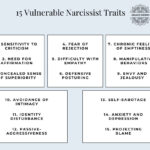Weird Things Covert Narcissists Do – 20 Weird Habits of Narcissists
In this comprehensive guide, we delve into the weird things covert narcissists do. Covert narcissists operate subtly, their actions often go unnoticed until significant harm has been done.
From manipulation tactics to insidious gaslighting, we’re uncovering 20 of the most weird habits of narcissists. Understanding their behavior is the first step in protecting yourself from their damaging impact.
If you’re interested in healing from narcissistic abuse, I warmly welcome you to my Narcissistic Abuse Recovery Program. It’s an easy self-paced online course which you can do at your own pace. My signature program combines scientific and spiritual tools for holistic healing of the body, mind, and spirit.
15 Weird Things Covert Narcissists Do
Navigating the complex world of a covert narcissist mother or partner can be bewildering and painful. You’re not alone in this struggle. The following insights aim to alleviate some of your confusion, shedding light on their intricate, often baffling behaviors.
1. Gaslighting
Covert narcissists are masters at gaslighting. This manipulation tactic involves them questioning your reality, creating self-doubt, and making you feel like you’re losing your sanity. It’s a silent form of psychological abuse that can have severe long-term effects.
For instance, suppose you’re certain that a covert narcissist made a derogatory comment about you at a social gathering. However, when you confront them, they deny ever saying such a thing.
They may even accuse you of misunderstanding or misremembering the event, insisting that they would never say anything so hurtful. They could argue, “You’re always misinterpreting what I say,” or “You’re too sensitive.”
Over time, this consistent denial and questioning of your reality can make you doubt your own memory and judgment, leading to feelings of confusion and self-doubt. This is gaslighting in action, one of the 12 traits of a narcissist.
2. Passive-Aggressiveness
Instead of open hostility, one of the weird things covert narcissists do is display passive-aggressive behavior. They may use sarcastic comments, give the silent treatment, or subtly undermine you. This indirect expression of hostility can be difficult to identify and address.
For instance, a covert narcissist might constantly make sarcastic remarks about your achievements, belittling them under the guise of humor. When you express your discomfort, they may accuse you of not being able to take a joke, turning their passive aggression into your perceived fault.
Related: How to deal with a narcissist
3. Subtle Manipulation
Covert narcissists subtly control others by playing the victim or using guilt trips. This is one of the many narcissist red flags. They manipulate in a way that can seem caring or concerned, making it challenging to recognize their controlling intentions.
Let’s say you’re planning to spend an evening with friends. A covert narcissist may claim to feel unwell, requesting your company out of concern. You might feel guilty leaving them alone, canceling your plans. In reality, they’ve used guilt to control your actions subtly.
4. Disrespecting Boundaries
Another weird thing covert narcissists do is disregarding personal boundaries. They pry into your private matters or overstepping your personal boundaries. This disrespect can slowly erode your sense of self and personal space.
Imagine a scenario where a covert narcissist insists on knowing your phone’s password, under the pretense of trust and openness in a relationship. But over time, you find them regularly checking your messages or social media without your consent. This is a clear violation of your personal boundaries.
Related: How Does a Narcissist React When You Stop Chasing Them?
5. Lack of Empathy
Covert narcissists struggle to show genuine empathy. They’re often unable to understand or share the feelings of others, making their interactions one-sided and self-centered.
For example, when divorcing a narcissist, you’re likely to face an uphill emotional battle. You may express your feelings of hurt, seeking empathy and support.
However, a covert narcissist often disregards your emotions, focusing solely on their own perspective. They might accuse you of causing the entire conflict, displaying a stark lack of empathy for your experience.
6. Constant Need for Admiration
Having an insatiable need for admiration is one of the main characteristics that drives covert narcissists to do weird things. They crave constant praise and attention, and may become resentful or defensive when they don’t receive it.
Consider a work scenario where a covert narcissist often basks in praise for their successes. However, when a colleague receives recognition, they might start sulking and utter things covert narcissists say, like, “Well, they just got lucky,” or “I would have done it better.” These remarks reveal their insatiable need for admiration.
7. Inability to Accept Criticism
Covert narcissists cannot accept criticism or perceived slights. Any criticism, no matter how constructive, may trigger a disproportionate defensive reaction.
Let’s say you kindly suggest to a covert narcissist that they should consider other people’s opinions in group decisions. Instead of accepting this constructive criticism, they may become defensive and argue that their decisions are always the best, showing their inability to accept criticism.
8. Projecting their Insecurities
Another creepy thing cover narcissists do is projecting their insecurities onto others, blaming them for their own shortcomings. This projection can leave you feeling inadequate and confused.
For instance, if a covert narcissist is struggling with their work performance, they may project their insecurities onto you by accusing you of being unsupportive or distracting. This projection can make you question your own behavior, leaving you feeling inadequate.
Related: 10 Symptoms of Daughters of Narcissistic Mothers
9. Grandiose Sense of Self-Importance
Covert narcissists harbor a grandiose sense of self-importance. They often see themselves as superior to others, deserving of special treatment, and expect others to comply.
Imagine a scenario where a covert narcissist insists on being the first to be served at a family dinner or expects the best seat in a group outing. They justify it by saying things like, “I’ve had a longer day,” reflecting their inflated sense of self-importance.
Related: How to Make a Narcissist Fear You
10. Emotional Blackmail
Using guilt, fear, or obligation, covert narcissists may resort to emotional blackmail to manipulate and control their relationships. This toxic behavior can be emotionally draining.
A real-life example of emotional blackmail could be a covert narcissist threatening to end the relationship every time there’s a disagreement. This places you in a constant state of fear and guilt, pushing you to comply with their demands to maintain peace.
Related: 40 Signs A Narcissist Is Done With You
11. Making Everything About Them
They have a habit of turning any conversation or situation around to focus on them, even if it’s inappropriate or irrelevant. This constant centering of self can be tiring for those around them.
For example, if you’re discussing a health issue you’re facing, a covert narcissist might immediately turn the conversation to a time when they were unwell, making the conversation about them, not your concerns.
12. Manipulative Generosity
Covert narcissists may use acts of generosity to manipulate others. These seemingly kind gestures often come with strings attached, meant to create a sense of obligation.
A covert narcissist might surprise you with an expensive gift. However, they later use this act of generosity to guilt-trip you into doing something for them, saying things like, “After all I’ve done for you, you can’t do this one thing for me?”
13. Playing the Victim
They often play the victim to gain sympathy or attention. By portraying themselves as innocent victims, they manipulate others into offering support or avoiding confrontation.
In an argument, instead of addressing the issue at hand, a covert narcissist might divert attention by bringing up past hardships they’ve faced, seeking to gain sympathy and turn the tables. This tactic helps them avoid responsibility for their actions.
When it comes to narcissists and empaths, the ‘playing the victim’ strategy can be especially potent. For instance, a covert narcissist may share tales of their traumatic past or current struggles to an empath, knowing their empathetic nature would compel them to offer emotional support.
Despite the narcissist’s consistent harmful behaviors, the empath might find themselves constantly giving them the benefit of the doubt, and even neglecting their own needs in the process. This manipulation allows the narcissist to maintain control while exploiting the empath’s compassionate nature.
14. Devaluing Others
Covert narcissists have a habit of belittling or devaluing others to inflate their own ego. This behavior can harm the self-esteem of those around them.
A covert narcissist might consistently point out your mistakes in front of others, making disparaging comments about your skills or character. This belittlement is a tactic to boost their own image at your expense, leaving you feeling undervalued.
Related: Narcissist Memes
15. Denial of Their Narcissism
Despite their harmful behavior, covert narcissists often deny their narcissism. This is one of the most frustrating weird things covert narcissists do. They may justify their actions or shift the blame, refusing to acknowledge their problematic behavior.
For example, if you confront a covert narcissist about their manipulative behavior, they may deny being a narcissist altogether. They could say, “I’m not manipulative, I’m just straightforward,” or “You’re just too sensitive.” Such denials allow them to avoid accountability and continue their harmful patterns.
Related: How Does a Narcissist React When They Can’t Control You?
5 Surprising Weird Things Covert Narcissists Do That No One Talks About
Aside from the typical behaviors you may already recognize, there are more subtle, unexpected actions that covert narcissists perform that often slip under the radar. Let’s explore five more bizarre habits that can help you identify covert narcissism in relationships, even when it seems hidden.
1. Feigning Interest in Your Passions
Covert narcissists may pretend to show interest in your hobbies or passions, only to subtly devalue them over time. This tactic not only gives them control but also leads to the erosion of your self-worth as they dismiss what matters most to you.
2. Silent Competitiveness
Unlike overt narcissists who loudly proclaim their superiority, covert narcissists harbor a secret competitive streak. They may subtly undermine your accomplishments or work hard behind the scenes to outdo you. If they can’t win, they may downplay the importance of what you achieved, twisting the narrative to favor themselves.
3. Overcompensating with Humility
To avoid detection, a covert narcissist may go out of their way to appear humble. They will often use phrases like, “I’m just doing my best” or “I’m not as talented as others think,” to lure admiration while masking their inflated sense of self. This tactic keeps people from suspecting their true nature.
4. False Generosity
On the surface, covert narcissists might appear generous, offering help when you least expect it. But beware, this help often comes with hidden intentions. They’ll expect something in return later, usually in the form of praise, loyalty, or control. Their “generosity” is often used to manipulate.
5. Reluctant to Share Their Own Failures
One peculiar thing covert narcissists do is avoid talking about their failures, even in close relationships. If they ever mention a personal failure, they’ll typically shift the blame onto others, refusing to take responsibility. This makes it difficult to have a transparent, open relationship with them.
5 Tips on Dealing with the Weird Things Covert Narcissists Do
Navigating relationships with covert narcissists can be challenging. Here are five practical tips to help you manage these interactions effectively:
- Set Boundaries: Clear boundaries are crucial in dealing with covert narcissists. Decide what behavior you will tolerate and what you won’t, and communicate these boundaries clearly.
- Practice Self-Care: Prioritize your mental and physical health. Regular exercise, a balanced diet, mindfulness practices, and adequate sleep can all help maintain your resilience.
- Educate Yourself: Knowledge is power. The more you understand about narcissism, the better equipped you’ll be to handle their behaviors.
- Avoid Self-Blame: Remember, it’s not your fault. The manipulative behaviors of a covert narcissist can lead to feelings of self-doubt, but it’s important to understand that you’re not to blame for their actions.
- Seek Support: It’s important not to isolate yourself. Reach out to trusted friends, family, or mental health professionals through narcissistic abuse therapy. Professionals can help you by providing perspective, healing techniques, and emotional support.
Understanding the complex and manipulative behaviors of covert narcissists is the first step towards reclaiming your sense of self. These tips are aimed to help you navigate these intricate dynamics, empowering you to set boundaries, protect your mental health, and break free from the cycle of manipulation.
If you’ve recognized these weird things covert narcissists do in your own experiences, remember you’re not alone, and help is available. Consider my comprehensive healing program, designed to support you through the journey of recovery and equip you with tools to rebuild a life of freedom and self-love.
My Related Services:
–Narcissistic Abuse Recovery Program: Join a structured program that provides tools, resources, and guidance to help you navigate and heal from the impact of narcissistic abuse.
–Mindfulness Meditation Practice: Discover the power of mindfulness with me as your meditation teacher. This practice has been a transformative tool in helping me gain mental clarity, rebuild self-trust, and respond consciously rather than reacting impulsively. Book a free call today and learn how mindfulness can calm your nervous system and bring peace into your life.
–Email Advice: Get guidance, insights, and support directly to your inbox.
FAQs
Here are weird things covert narcissists do:
1. Passive-Aggressive Behavior
2. Subtle Manipulation
3. Disrespecting Boundaries
4. Emotional Blackmail
5. Inability to Accept Criticism
Covert narcissists habitually belittle others, struggle to show empathy, harbor grandiosity, and seek constant admiration. They’re manipulatively generous, often play the victim, and resort to emotional blackmail.
Covert narcissists fear exposure and rejection most. They dread the idea of their manipulative behavior being uncovered, leading to a loss of control or admiration.
A covert narcissist gets annoyed when they don’t receive constant admiration or when their self-perceived superiority is challenged. They also dislike criticism, even if it’s constructive.
Additional Resources
Do Narcissists Cry?
Things Narcissistic Mothers Say
Why a Narcissist Won’t Divorce You
Healing from Narcissistic Abuse
Do Narcissists Know They Are Narcissists?
Signs You’re Healing From Narcissistic Abuse






